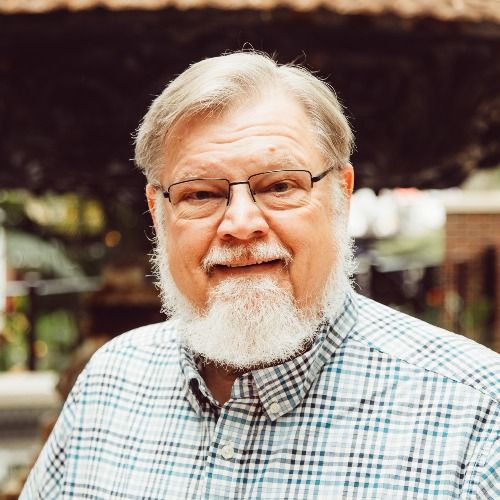Episode 935
From Trafficking to Transformation: Divine Solidarity in Displacement
The "Daily Bible Refresh" is presented each day by Rev. Dr. Brad Miller who has a goal of speaking a bit of the bible into two million ears (one million people) in three years (2025-2028).
He is the author of "The A, B, C-1,2,3 Bible Study Guide" Free to you by clicking HERE.
Brad served as a local church pastor for forty years and has a background in radio and podcasting. Moreover, he is a life-long student of The Bible.
He believes in the words of Jesus that “scripture is fulfilled in your hearing” (Luke 4:21)
The "Daily Bible Refresh" is available seven days a week by 6:00 am ET. The episodes are no longer than ten minutes long and are...
- Understandable: A reading from the New Testament (usually the Gospel) selected from the Revised Common Lectionary using "The Message" translation.
- Relatable: You will have a couple of "points to ponder" from the text which will relate to your life
- Applicable: Every episode includes a way you can take action based on the reading
- A recommended resource to help you go deeper in biblical study and spiritual direction.
- A prayer for your day.
A companion resource to the Voice of God Daily Podcast is the “ABC Bible Study Guide” available by clicking HERE.
The "Daily Bible Refresh" is available every day at VoiceofGodDaily.com on Apple Podcasts, Spotify and all major podcast directories.
You can help Dr. Brad attain his goal of getting a bit of the bible into two million ears by subscribing to "Daily Bible Refresh" on Apple Podcasts, leaving a five-star rating, and writing a review. More importantly please share with your network of family and friends about the "Daily Bible Refresh".
Please make listening to the "Daily Bible Refresh" a part of your daily life.
Remember… “All scripture is God-breathed and useful”(2 Timothy 3:16)
Exploring the profound themes of displacement and resilience, the discussion centers on Acts 7, 9, and 16, particularly the narrative of Joseph as recounted by Stephen. This retelling serves as a poignant reminder of the historical and contemporary issues surrounding human trafficking and forced migration. Joseph, initially betrayed by his brothers and sold into slavery, ultimately rises to a position of power in Egypt, becoming a pivotal figure for his family’s survival during a devastating famine. The complexities of his journey highlight the divine presence amid suffering, illustrating how even in the darkest circumstances, one can find purpose and hope. As we delve into Joseph's story, we reflect on the implications of this narrative for understanding the plight of trafficked individuals and the broader socio-economic systems that perpetuate such injustices. The discussion encourages listeners to ponder the role of divine solidarity with the afflicted and challenges us to reconsider narratives that oversimplify human suffering as mere divine testing. Furthermore, it invites us to explore how we can engage with these issues at both personal and communal levels, thus fostering a deeper understanding of the human condition and our responsibility towards those in distress.
The episode presents a critical examination of systemic injustices through Joseph's ascent within the Egyptian power structure. While his actions during the famine saved countless lives, they simultaneously embedded him deeper within an oppressive regime. This duality prompts a discussion on the ethical dilemmas faced by individuals who navigate complex systems of power. How does one balance the need to survive and effect change within a system that may be fundamentally unjust? The conversation raises essential questions about complicity and resistance, urging listeners to reflect on their positions in contemporary societal structures. It further emphasizes the importance of discernment in our actions, as we strive to support marginalized communities while grappling with the realities of the systems we inhabit. This exploration not only broadens our understanding of Joseph's story but also serves as a catalyst for personal introspection regarding our roles in perpetuating or dismantling systemic issues.
In addition to addressing systemic injustices, the episode delves into the theme of intergenerational trauma and the potential for healing. The narrative transitions from betrayal to reconciliation, illustrating the complex dynamics of family relationships across generations. While the reconciliation of Joseph with his brothers offers a glimmer of hope, it does not erase the historical wounds inflicted by their actions. This aspect of the discussion invites listeners to consider the implications of unresolved trauma within families and communities, and what authentic reconciliation might entail. How do we confront the past while fostering healing in the present? The conversation encourages listeners to engage with these themes actively, whether through supporting organizations that assist displaced individuals or advocating for policies that address the root causes of trauma. Ultimately, the episode serves as a call to action, prompting us to seek constructive pathways towards healing and justice, both for ourselves and for those who bear the scars of historical injustices.
Takeaways:
- The narrative of Joseph, as retold in Acts, intricately intertwines themes of human trafficking and divine presence, challenging contemporary understandings of suffering.
- Joseph's ascent to power within the oppressive Egyptian system raises significant questions about ethical engagement with unjust structures.
- The story also explores the dynamics of intergenerational trauma, emphasizing the need for authentic reconciliation amid deep-rooted familial wounds.
- We are encouraged to actively support organizations that assist displaced individuals and trafficking survivors, fostering awareness and systemic change in our communities.
- This episode urges listeners to reflect on the complexities of navigating oppressive systems while pursuing justice and change for marginalized populations.
- The discussion highlights the importance of divine solidarity with those who endure suffering, reiterating that God remains present with the afflicted.
Links referenced in this episode:
Companies mentioned in this episode:
- voiceofgoddaily.com
Transcript
From Trafficking to Transformation Finding Divine Solidarity in Displacement A Deep dive into Acts 7, 9, 16 on the Daily Bible refresh with Dr. Brad Miller hello my good friends.
Speaker A:Dr. Brad Miller here with the Daily Bible Refresh, a daily walk into the New Testament of the Bible.
Speaker A:From a progressive perspective, we make the reading of the Bible understandable.
Speaker A:We use the Message version relatable.
Speaker A:We offer points to ponder and applicable by giving you some action steps to follow.
Speaker A:We use the Revised Common Lectionary.
Speaker A:That's the daily selected verse of Scripture for this very day.
Speaker A:We're in year C of a three year cycle to Pentecost season.
Speaker A: million ears by: Speaker A:Let's get into our message get into our reading for today from Acts 7, 9, 16 from the message but then those fathers, burning up with jealousy, sent Joseph off to Egypt as a slave.
Speaker A:God was right there with him, though.
Speaker A:He not only rescued him from all his troubles, but brought him to the attention of Pharaoh, the king of Egypt.
Speaker A:He was so impressed with Joseph that he put him in charge of the whole country, including his own personal affairs.
Speaker A:Later, a famine descended into that entire region stretching from Egypt to Canaan, bringing terrific hardship.
Speaker A:Our hungry fathers looked high and low for food, but the cupboard was bare.
Speaker A:Jacob heard there was food in Egypt and sent our fathers to scout it out.
Speaker A:Having confirmed the report, they went back to Egypt a second time to get food.
Speaker A:On that visit, Joseph revealed his true identity to his brothers and introduced the Jacob family to Pharaoh.
Speaker A:Then Joseph sent for his father Jacob and everyone else in the family.
Speaker A:75 in all, that's how the Jacob family got to Egypt.
Speaker A:Jacob died and our brothers after him, and they were taken to Shechem and buried in the tomb for which Abraham paid a good price and to the sons of Hamar.
Speaker A:Well, my good, my good friends, interesting passage of scripture here for us to delve into here today.
Speaker A:We're exploring here.
Speaker A:This is in Acts, this passage from Acts 7, Stephen's retelling of the Joseph story, a narrative about human trafficking, family trauma and the divine presence of forced migration.
Speaker A:So let's set the scene here.
Speaker A:Stephen is recalling how Joseph was trafficked by his own brothers into slavery, yet became an instrument of survival for his family and others.
Speaker A:This story speaks powerfully to the contemporary issues of human trafficking, immigration, family separation and forced displacement.
Speaker A:Here are some points to ponder.
Speaker A:Divine solidary solidarity with the trafficked the text here emphasizes that God was right there with him, talking about Joseph now.
Speaker A:So when Joseph was sold into slavery, God was with him.
Speaker A:So this isn't about divine endorsement of suffering, but about God's presence with those who are trafficked and exploited.
Speaker A:How does this challenge prosperity gospel narratives and reshape our understanding of of divine presence in human suffering?
Speaker A:The second point is about systems of survival.
Speaker A:Joseph's rise to power in Egypt raises complex questions about working within oppressive systems while trying to create change.
Speaker A:While he saved lives during the famine, he was also a part of Pharaoh's power structure.
Speaker A:How do we navigate similar tensions?
Speaker A:Today we are addressing systematic injustice.
Speaker A:When do we work within the system and when do we resist it?
Speaker A:There's also this intergenerational trauma and healing as a third point.
Speaker A:So the story moves from brotherly betrayal to reconciliation across the generations.
Speaker A:Yet this healing doesn't erase the history or its consequences.
Speaker A:So how do we address generational trauma in our communities?
Speaker A:What does authentic reconciliation look like when the wounds are deep and structural?
Speaker A:Let's talk about some action steps now.
Speaker A:You might want I would ask you to research organizations in your area that work with displaced people, traffic survivors or people who are in the margins and choose some way to support that or be more aware about that.
Speaker A:That might be through some financial contributions or volunteering your time or being an advocate for policy changes that address the causes of these problems or just to learn about trauma, informed people and ways that we can support that.
Speaker A:Remember, support when we support survivor led organizations and follow their lead that can help us as well.
Speaker A:We're going to come back and have a prayer.
Speaker A:Before we do I just a reminder that we have a great resource just for you.
Speaker A:It's called the ABC123 Bible Study Method.
Speaker A:Head over to our website voiceofgoddaily.com and you can pick it up there.
Speaker A:Free to you.
Speaker A:Let's pray.
Speaker A:Oh God of the displaced, you who travel with Joseph into slavery.
Speaker A:Be with all who are trafficked today.
Speaker A:You who witness family betrayal.
Speaker A:Guide us toward paths of healing when systems seem too big to change.
Speaker A:Show us how to resist and transform.
Speaker A:Help us create communities of care where wounds can be named, where healing can begin and where justice takes root.
Speaker A:Make us instruments of your liberation, both personal and systematic.
Speaker A:Amen.
Speaker A:Well good friends, it's always good to be with you here on Daily Bible Refresh.
Speaker A:We would love it if you would consider supporting our efforts here.
Speaker A: ionaires, a million people by: Speaker A:You just go to voiceofgoddaily.com, scroll to the bottom of the page and your gift of any amount is appreciated.
Speaker A:You can also support us by subscribing to the podcast, inviting others to join us.
Speaker A:We're here every single day.
Speaker A:We usually drop our episodes before 6am you'll find me here.
Speaker A:My name is Dr. Brad Miller.
Speaker A:We'll see you again tomorrow.
Speaker A:Until till then, remember that God's loyal love doesn't run out.
Speaker A:His merciful love hasn't dried up, it's created new every morning.



